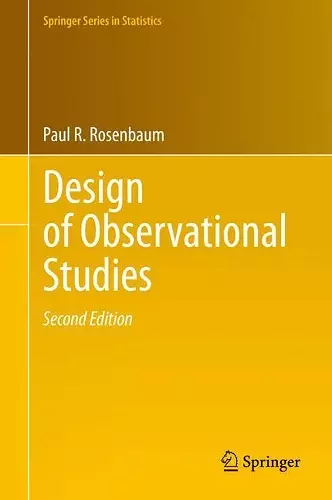Design of Observational Studies
Format:Hardback
Publisher:Springer Nature Switzerland AG
Published:14th Jul '20
Currently unavailable, and unfortunately no date known when it will be back
This hardback is available in another edition too:
- Paperback£129.99(9783030464073)

This second edition of Design of Observational Studies is both an introduction to statistical inference in observational studies and a detailed discussion of the principles that guide the design of observational studies. An observational study is an empiric investigation of effects caused by treatments when randomized experimentation is unethical or infeasible. Observational studies are common in most fields that study the effects of treatments on people, including medicine, economics, epidemiology, education, psychology, political science and sociology. The quality and strength of evidence provided by an observational study is determined largely by its design.
Design of Observational Studies is organized into five parts. Chapters 2, 3, and 5 of Part I cover concisely many of the ideas discussed in Rosenbaum’s Observational Studies (also published by Springer) but in a less technical fashion. Part II discusses the practical aspects of using propensity scores and other tools to create a matched comparison that balances many covariates, and includes an updated chapter on matching in R. In Part III, the concept of design sensitivity is used to appraise the relative ability of competing designs to distinguish treatment effects from biases due to unmeasured covariates. Part IV is new to this edition; it discusses evidence factors and the computerized construction of more than one comparison group. Part V discusses planning the analysis of an observational study, with particular reference to Sir Ronald Fisher’s striking advice for observational studies: "make your theories elaborate."
This new edition features updated exploration of causal influence, with four new chapters, a new R package DOS2 designed as a companion for the book, and discussion of several of the latest matching packages for R. In particular, DOS2 allows readers to reproduce many analyses from Design of Observational Studies.“References are listed after each chapter … reflecting the wealth of his contribution to the subject of causal inference over the last four decades. … The book is a comprehensive account of methods for comparing treatments in an observational study, rich with detailed illustrations using data for inferences of substance in education, epidemiology, economics and clinical medicine. … this is an absolute `must' for reading and reference for every statistician who works with observational studies … .” (Nicholas T. Longford, Mathematical Reviews, April, 2022)
“This book is readily usable for self-study, a graduate seminar, or use by a practitioner getting their bearings in the field. The book is filled with references to both foundational work and cutting-edge approaches. … the book was an easy read. Rosenbaum provides practical advice, delivered in a conversational tone, and steers clear of theweeds that might bog a reader down in the main text. steers clear of the weeds that might bog a reader down in the main text.” (Sara Stoudt, MAA Reviews, July 24, 2021)
ISBN: 9783030464042
Dimensions: unknown
Weight: unknown
547 pages
Second Edition 2020